Papers written by Hodgkin, Ernest P. (Doctor, b.1908 - d.1998) - Part 16
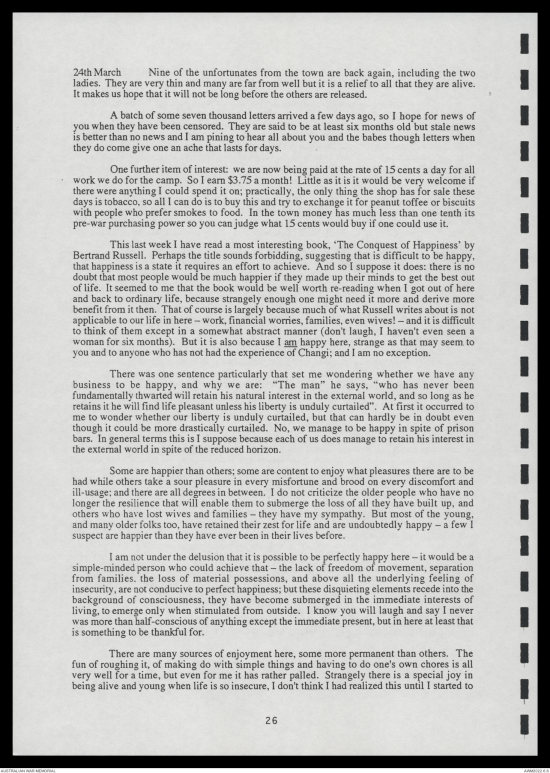
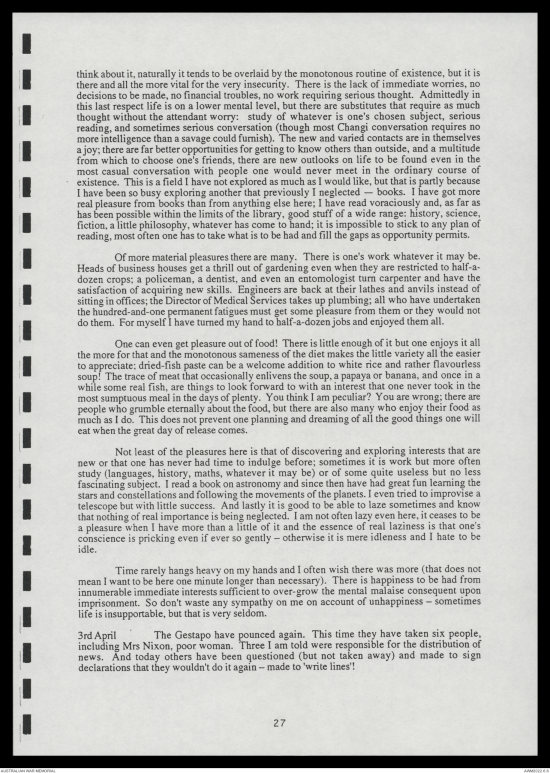
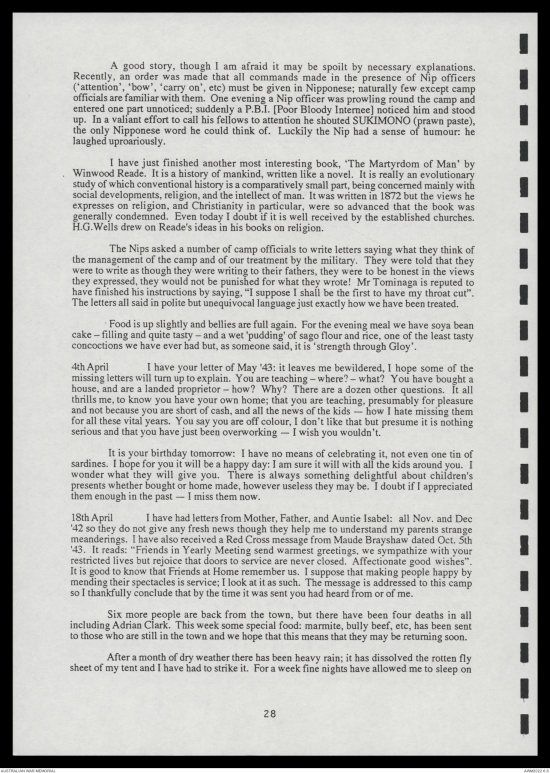
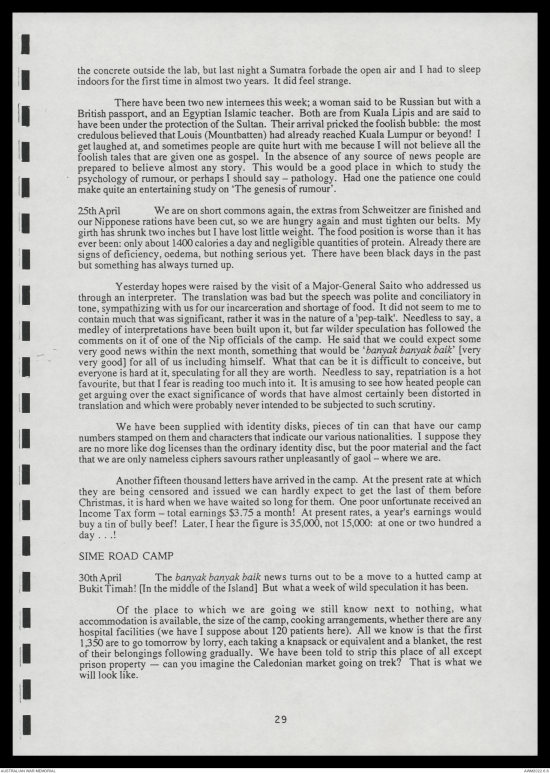
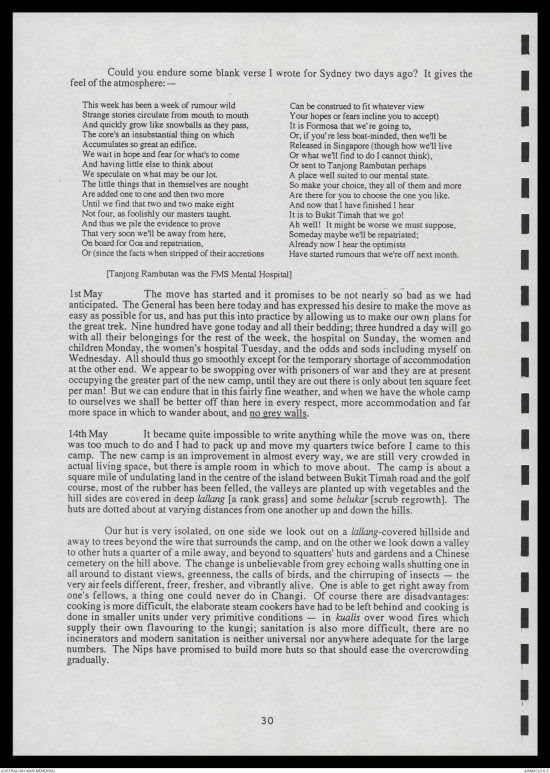
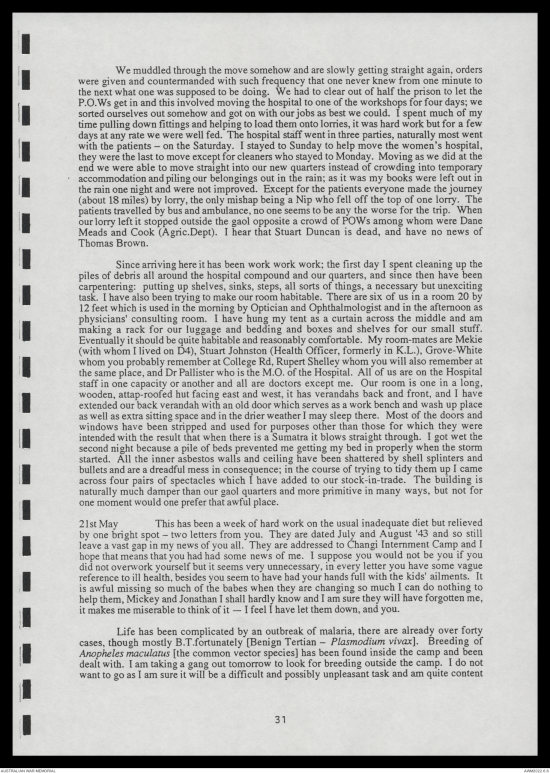
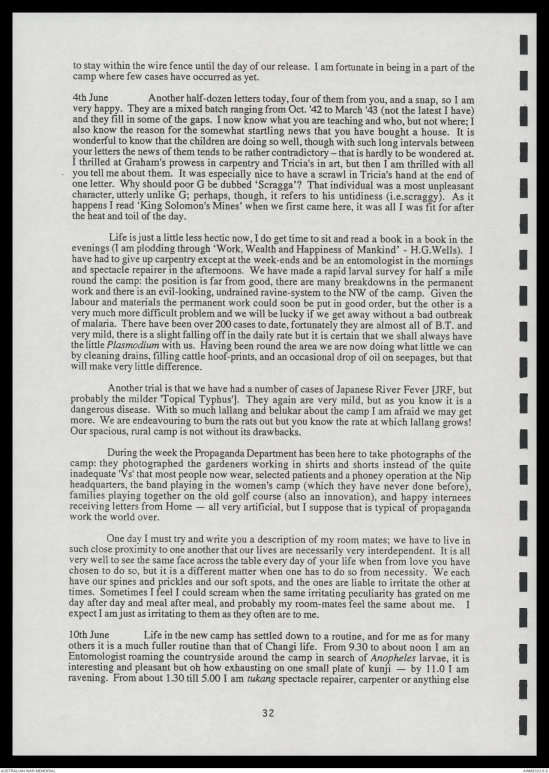
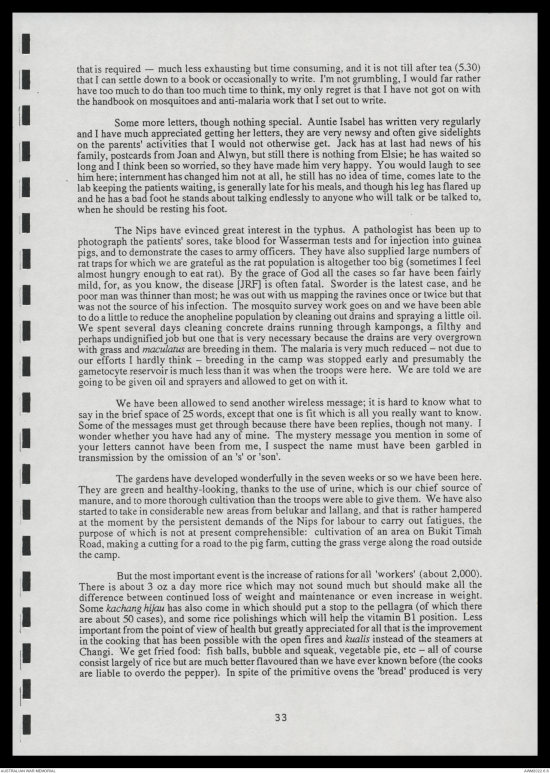
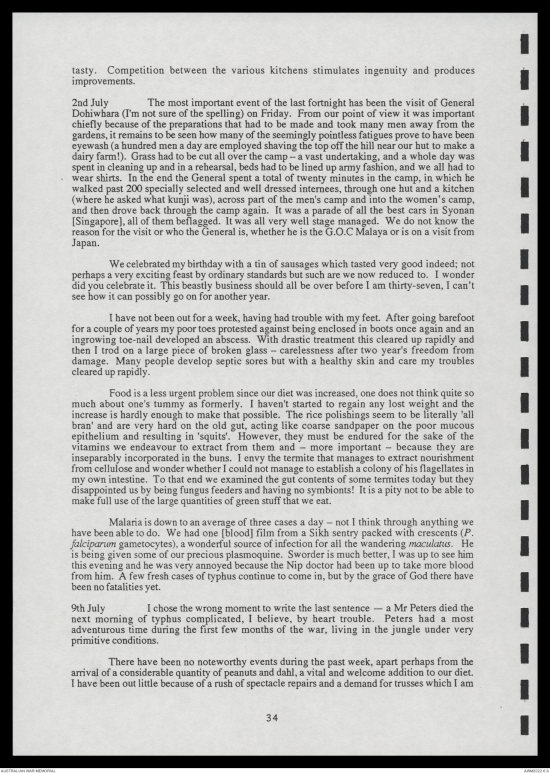
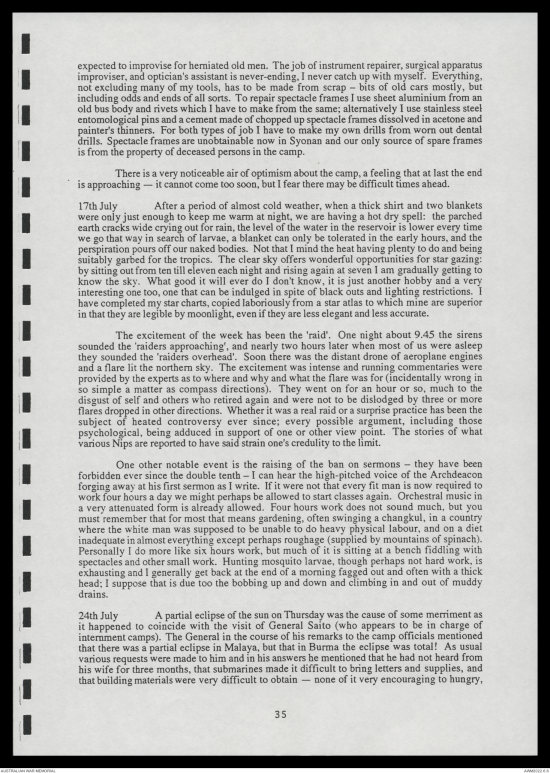
24th March Nine of the unfortunates from the town are back again, including the two
ladies. They are very thin and many are far from well but it is a relief to all that they are alive.
It makes us hope that it will not be long before the others are released.
A batch of some seven thousand letters arrived a few days ago, so I hope for news of
you when you have been censored. They are said to be at least six months old but stale news
is better than no news and I am pining to hear all about you and the babes though letters when
they do come give on an ache that lasts for days.
One further item of interest: we are now being paid at the rate of 15 cents a day for all
work we do for the camp. So I earn $3.75 a month! Little as it is it would be very welcome if
there were anything I could spend it on; practically, the only thing the shop has for sale these
days is tobacco, so all I can do is buy this and try to exchange it for peanut toffee or biscuits
with people who prefer smokes to food. In the town money has much less than one tenth its
pre-war purchasing power so you can judge what 15 cents would buy if one could use it.
This last week I have read a most interesting book. 'The Conquest of Happiness' by
Bertrand Russell. Perhaps the title sounds forbidding, suggesting that it is difficult to be happy,
that happiness is a state it requires an effort to achieve. And so I suppose it does; there is no
doubt that most people would be much happier if they made up their minds to get the best out
of life. It seemed to me that the book would be well work rereading when I got out of here
and back to ordinary life, because strangely enough one might need it more and derive more
benefit from it then. That of course is largely because much of what Russell writes about is not
applicable to our life in here — work, financial worries, families, even wives! — and it is difficult
to think of them except in a somewhat abstract manner (don't laugh, I haven't even seen a
woman for six months). But it is also because I am happy here, strange as that may seem to
you and to anyone who has not had the experience of Changi; and I am no exception.
There was one sentence particularly that set me wondering whether we have any
business to be happy, and why we are: "The man" he says, "who has never been
fundamentally thwarted will retain his natural interest in the external world, and so long as he
retains it he will find life pleasant unless his liberty is unduly curtailed". At first it occurred to
me to wonder whether our liberty is unduly curtailed, but that can hardly be in doubt even
though it could be more drastically curtailed. No, we manage to be happy in spite of prison
bars. In general terms this is I suppose because each of us does manage to retain his interest in
the external world in spite of the reduced horizon.
Some are happier than others; some are content to enjoy what pleasures there are to be
had while others take a sour pleasure in every misfortune and brood on every discomfort and
ill-usage; and there are all degrees in between. I do not criticize the older people who have no
longer the resilience that will enable them to submerge the loss of all they have built up, and
others who have lost wives and families — they have my sympathy. But most of the young,
and many older folks too, have retained their zest for life and are undoubtedly happy — a few I
suspect are happier than they have ever been in their lives before.
I am not under the delusion that is is possible to be perfectly happy here — it would be a
simple-minded person who could achieve that — the lack of freedom of movement, separation
from families, the loss of material possessions, and above all the underlying feeling of
insecurity, are not conducive to perfect happiness; but these disquieting elements recede into the
background of consciousness they have become submerged in the immediate interests of
living, to emerge only when stimulated from outside. I know you will laugh and say I never
was more than half-conscious of anything except the immediate present, but in here at least that
is something to be thankful for.
There are many sources of enjoyment here, some more permanent than others. The
fun of roughing it, of making do with simple things and having to do one's own chores is all
very well for a time, but even for me it has rather palled. Strangely there is a special joy in
being alive and young when life is so insecure, I don't think I had realized this until I started to
26
think about it, naturally it tends to be overlaid by the monotonous routine of existence, but it is
there and all the more vital for the very insecurity. There is the lack of immediate worries, no
decisions to be made, no financial troubles, no work requiring serious thought. Admittedly in
this last respect life is on a lower mental level, but there are substitutes that require as much
thought without the attendant worry: study of whatever is one's chosen subject, serious
reading, and sometimes serious conversation (though most Changi conversation requires no
more intelligence than a savage could furnish). The new and varied contacts are in themselves
a joy: there are far better opportunities for getting to know others than outside, and a multitude
from which to choose one's friends, there are new outlooks on life to be found even in the
most casual conversation with people one would never meet in the ordinary course of
existence. This is a field I have not explored as much as I would like, but that is partly because
I have been so busy exploring another that previously I neglected — books. I have got more
real pleasure from books than from anything else here; I have read voraciously and, as far as
has been possible within the limits of the library, good stuff of a wide range: history, science,
fiction, a little philosophy, whatever has come to hand; it is impossible to stick to any plan of
reading, most often one has to take what is to be had and fill the gaps as opportunity permits.
Of more material pleasures there are many. There is one's work whatever it may be.
Heads of business houses get a thrill out of gardening even when they are restricted to half-a-dozen
crops; a policeman, a dentist, and even an entomologist turn carpenter and have the
satisfaction of acquiring new skills. Engineers are back at their lathes and anvils instead of
sitting in offices; the Director of Medical Services takes up plumbing; all who have undertaken
the hundred-and-one permanent fatigues must get some pleasure from them or they would not
do them. For myself I have turned my hand to half-a-dozen jobs and enjoyed them all.
One can even get pleasure out of food! There is little enough of it but one enjoys it all
the more for that and the monotonous sameness of the diet makes the little variety all the easier
to appreciate: dried-fish paste can be a welcome addition to white nice and rather flavourless
soup! The trace of meat that occasionally enlivens the soup, a papaya or banana, and once in a
while some real fish, are things to look forward to with an interest that one never took in the
most sumptuous meal in the days of plenty. You think I am peculiar? You are wrong: there are
people who grumble eternally about the food, but there are also many who enjoy their food as
much as I do. This does not prevent one planning and dreaming of all the good things one will
eat when the great day of release comes.
Not least of the pleasures here is that of discovering and exploring interests that are
new or that one has never had time to indulge before; sometimes it is work but more often
study (languages, history, maths, whatever it may be) or of some quite useless but no less
fascinating subject. I read a book on astronomy and since then have had great fun learning the
stars and constellations and following the movements of the planets. I even tried to improvise a
telescope but with little success. And lastly it is good to be able to laze sometimes and know
that nothing of real importance is being neglected. I am not often lazy even here, it ceases to be
a pleasure when I have more than a little of it and the essence of real laziness is that one's
conscience is pricking even if ever so gently — otherwise it is mere idleness and I hate to be
idle.
Time rarely hangs heavy on my hands and I often wish there was more (that does not
mean I want to be here one minute longer than necessary). There is happiness to be had from
innumerable immediate interests sufficient to over-grow the mental malaise consequent upon
imprisonment. So don't waste any sympathy on me on account of unhappiness — sometimes
life is insupportable, but that is very seldom.
3rd April The Gestapo have pounced again. This time they have taken six people,
including Mrs Nixon, poor woman. Three I am told were responsible for the distribution of
news. And today others have been questioned (but not taken away) and made to sign
declarations that they wouldn't do it again — made to 'write lines'!
27
A good story, though I am afraid it may be spoilt by necessary explanations.
Recently, an order was made that all commands made in the presence of Nip officers
('attention", 'bow', 'carry on', etc) must be given in Nipponese; naturally few except camp
officials are familiar with them. One evening a Nip officer was prowling round the camp and
entered one part unnoticed; suddenly a P.B.I. [Poor Bloody Internee] noticed him and stood
up. In a valiant effort to call his fellows to attention he shouted SUKIMONO (prawn paste),
the only Nipponese word he could think of. Luckily the Nip had a sense of humour: he
laughed uproariously.
I have just finished another most interesting book, "The Martyrdom of Man' by
Winwood Reade. It is a history of mankind, written like a novel. It is really an evolutionary
study of which conventional history is a comparatively small part, being concerned mainly with
social developments, religion, and the intellect of man. It was written in 1872 but the views he
expresses on religion, and Christianity in particular, were so advanced that the book was
generally condemned. Even today I doubt if it is well received by the established churches.
H.G.Wells drew on Reade's ideas in his books on religion.
The Nips asked a number of camp officials to write letters saying what they think of
the management of the camp and of our treatment by the military. They were told that they
were to write as though they were writing to their fathers, they were to be honest in the views
they expressed, they would not be punished for what they wrote! Mr Tominaga is reputed to
have finished his instructions by saying. "I suppose I shall be the first to have my throat cut".
The letters all said in polite but unequivocal language just exactly how we have been treated.
Food is up slightly and bellies are full again. For the evening meal we have soya bean
cake — filling and quite tasty — and a wet 'pudding' of sago flour and rice, one of the least tasty
concoctions we have ever had but, as someone said, it is 'strength through Gloy'.
4th April I have your letter of May '43: it leaves me bewildered, I hope some of the
missing letters will turn up to explain. You are teaching — where? — what? You have bought a
house, and are a landed proprietor — how? Why? There are a dozen other questions. It all
thrills me, to know you have your own home; that you are teaching, presumably for pleasure
and not because you are short of cash, and all the news of the kids —
how I hate missing them for all these vital years. You say you are off colour. I don't like that but presume it is nothing
serious and that you have just been overworking — I wish you wouldn't.
It is your birthday tomorrow: I have no means of celebrating it, not even one tin of
sardines. I hope for you it will be a happy day: I am sure it will with all the kids around you. I
wonder what they will give you. There is always something delightful about children's
presents whether bought or home made, however useless they may be. I doubt if I appreciated
them enough in the past — I miss them now.
18th April I have had letters from Mother, Father, and Auntie Isabel: all Nov. and Dec
'42 so they do not give any fresh news though they me to understand my parents strange
meanderings. I have also received a Red Cross message from Maude Brayshaw dated Oct. 5th
'43. It reads: "Friends in Yearly Meeting send warmest greetings, we sympathize with your
restricted lives but rejoice that doors to service are never closed.
Affectionate good wishes".
It is good to know that Friends at Home remember us. I suppose that making people happy by
mending their spectacles is service; I look at it as such. The message is addressed to this camp
so I thankfully conclude that by the time it was sent you had heard from or of me.
Six more people are back from the town, but there have been four deaths in all
including Adrian Clark. This week some special food: marmite, bully beef, etc, has been sent
to those who are still in the town and we hope that this means that they may be returning soon.
After a month of dry weather there has been heavy rain; it has dissolved the rotten fly
sheet of my tent and I have had to strike it. For a week fine nights have allowed me to sleep on
28
the concrete outside the lab, but last night a Sumatra forbade the open air and I had to sleep
indoors for the first time in almost two years. It did feel strange.
There have been two new internees this week; a woman said to be Russian but with a
British passport, and an Egyptian Islamic teacher. Both are from Kuala Lipis and are said to
have been under the protection of the Sultan. Their arrival pricked the foolish bubble: the most
credulous believed that Louis (Mountbatten) had already reached Kuala Lumpur or beyond! I
get laughed at, and sometimes people are quite hurt with me because I will not believe all the
foolish tales that are given one as gospel. In the absence of any source of news people are
prepared to believe almost any story. This would be a good place in which to study the
psychology of rumour, or perhaps I should say — pathology. Had one the patience one could
make quite an entertaining study on 'The genesis of rumour'.
25th April We are on short commons again, the extras from Schweitzer are finished and
our Nipponese rations have been cut, so we are hungry again and must tighten our belts. My
girth has shrunk two inches but I have lost little weight. The food position is worse than it has
ever been: only about 1400 calories a day and negligible quantities of protein. Already there are
signs of deficiency, oedema, but nothing serious yet. There have been black days in the past
but something has always turned up.
Yesterday hopes were raised by the visit of a Major-General Saito who addressed us
through an interpreter.
The translation was bad but the speech was polite and conciliatory in
tone, sympathizing with us for our incarceration and shortage of food. It did not seem to me to
contain much that was significant, rather it was in the nature of a 'pep-talk'. Needless to say, a
medley of interpretations have been built upon it, but far wilder speculation has followed the
comments on it of one of the Nip officials of the camp. He said that we could expect some
very good news within the next month, something that would be 'banyak banyak baik" [very
very good] for all of us including himself. What that can be it is difficult to conceive, but
everyone is hard at it, speculating for all they are worth. Needless to say, repatriation is a hot
favourite, but that I fear is reading too much into it. It is amusing to see how heated people can
get arguing over the exact significance of words that have almost certainly been distorted in
translation and which were probably never intended to be subjected to such scrutiny.
We have been supplied with identity disks, pieces of tin can that have our camp
numbers stamped on them and characters that indicate our various nationalities. I suppose they
are no more like dog licenses than the ordinary identity disc, but the poor material and the fact
that we are only nameless ciphers savours rather unpleasantly of gaol — where we are.
Another fifteen thousand letters have arrived in the camp. At the present rate at which
they are being censored and issued we can hardly expect to get the last of them before
Christmas, it is hard when we have waited so long for them. One poor unfortunate received an
Income Tax form - total earnings $3.75 a month! At present rates, a year's earnings would
buy a tin of bully beef! Later. I hear the figure is 35,000, not 15,000: at one or two hundred a day . . .!
SIME ROAD CAMP
30th April The banyak banyak baik news turns out to be a move to a hutted camp at
Buki Pimah! [In the middle of the Island] But what a week of wild speculation it has been.
Of the place to which we are going we still know next to nothing, what
accommodation is available, the size of the camp, cooking arrangements, whether there are any
hospital facilities (we have I suppose about 120 patients here). All we know is that the first
1,350 are to go tomorrow by lorry, each taking a knapsack or equivalent and a blanket, the rest
of their belongings following gradually. We have been told to strip this place of all except
prison property — can you imagine the Caledonian market going on trek?
That is what we will look like.
29
Could you endure some blank verse I wrote for Sydney two days ago? It gives the
feel of the atmosphere:—
| This week has been a week of rumour wild | Can be construed to fit whatever view |
| Strange stories circulate from mouth to mouth | Your hopes or fears incline you to accept) |
| And quickly grow like snowballs as they pass, | It is Formosa that we're going to, |
| The core's an insubstantial thing on which | Or, if you're less boat-minded, then we'll be |
| Accumulates so great an edifice. | Released in Singapore (though how we'll live |
| We wait in hope and fear for what's to come | Or what we'll find to do I cannot think), |
| And having little else to think about | Or sent to Tanjong Rambutan perhaps |
| We speculate on what may be our lot. | A place well suited to our mental state. |
| The litte things that in themselves are nought | So make your choice, they all of them and more |
| Are added one to one and then two more | Are there for you to choose the one you like. |
| Until we find that two and two make eight | And now that I have finished I hear |
| Not four, as foolishly our masters taught. | It is to Bukit Timah that we go! |
| And thus we pile the evidence to prove | Ah well! It might be worse we must suppose. |
| That very soon we'll be away from here, | Someday maybe we'll be repatriated: |
| On board for Goa and repatriation, | Already now 1 hear the optimists |
| Or (since the facts when stripped of their accretions | Have started rumours that we're off next month. |
[Tanjong Rambutan was the FMS Mental Hospital]
1st May The move has started and it promises to be not nearly so bad as we had
anticipated. The General has been here today and has expressed his desire to make the move as
easy as possible for us, and has put this into practice by allowing us to make our own plans for
the great trek. Nine hundred have gone today and all their bedding; three hundred a day will go
with all their belongings for the rest of the week, the hospital on Sunday, the women and
children Monday, the women's hospital Tuesday, and the odds and sods including myself on
Wednesday. All should thus go smoothly except for the temporary shortage of accommodation
at the other end. We appear to be swopping over with prisoners of war and they are at present
occupying the greater part of the new camp, until they are out there is only about ten square feet
per man! But we can endure that in this fairly fine weather, and when we have the whole camp
to ourselves we shall be better off than here in every respect, more accommodation and far
more space in which to wander about, and no grey walls.
14th May It became quite impossible to write anything while the move was on, there
was too much to do and I had to pack up and move my quarters twice before I came to this
camp. The new camp is an improvement in almost every way, we are still very crowded in
actual living space, but there is ample room in which to move about. The camp is about a
square mile of undulating land in the centre of the island between Bukit Timah road and the golf
course, most of the rubber has been felled, the valleys are planted up with vegetables and the
hill sides are covered in deep lallang [a rank grass) and some belukar [scrub regrowth]. The
huts are dotted about at varying distances from one another up and down the hills.
Our hut is very isolated, on one side we look out on a lallang-covered hillside and
away to trees beyond the wire that surrounds the camp, and on the other we look down a valley
to other huts a quarter of a mile away, and beyond to squatters' huts and gardens and a Chinese
cemetery on the hill above. The change is unbelievable from grey echoing walls shutting one in
all around to distant views, greenness, the calls of birds, and the chirruping of insects — the
very air feels different, freer, fresher, and vibrantly alive. One is able to get right away from
one's fellows, a thing one could never do in Changi. Of course there are disadvantages:
cooking is more difficult, the elaborate steam cookers have had to be left behind and cooking is
done in smaller units under very primitive conditions — in kualis over wood fires which
supply their own flavouring to the kungi; sanitation is also more difficult, there are no
incinerators and modern sanitation is neither universal nor anywhere adequate for the large
numbers. The Nips have promised to build more huts so that should case the overcrowding
gradually.
30
We muddled through the move somehow and are slowly getting straight again, orders
were given and countermanded with such frequency that one never knew from one minute to
the next what one was supposed to be doing. We had to clear out of half the prison to let
the P.O.Ws get in and this involved moving the hospital to one of the workshops for four days; we
sorted ourselves out somehow and got on with our jobs as best we could. I spent much of my
time pulling down fittings and helping to load them onto lorries, it was hard work but for a few
days at any rate we were well fed. The hospital staff went in three parties, naturally most went
with the patients — on the Saturday. I stayed to Sunday to help move the women's hospital,
they were the last to move except for cleaners who stayed to Monday. Moving as we did at the
end we were able to move straight into our new quarters instead of crowding into temporary
accommodation and piling our belongings out in the rain; as it was my books were left out in
the rain one night and were not improved. Except for the patients everyone made the journey
(about 18 miles) by lorry, the only mishap being a Nip that fell off the top of one lorry. The
patients travelled by bus and ambulance, no one seems to be any the worse for the trip. When
our lorry left it stopped outside the gaol opposite a crowd of POWs among whom were Dane
Meads and Cook (Agric.Dept). I hear that Stuart Duncan is dead, and have no news of
Thomas Brown.
Since arriving here it has been work work work; the first day I spent cleaning up the
piles of debris all around the hospital compound and our quarters, and since then have been
carpentering: putting up shelves, sinks, steps, all sorts of things, a necessary but unexciting
task. I have also been trying to make our room habitable. There are six of us in a room 20 by
12 feet which is used in the morning by Optician and Ophthalmologist and in the afternoon as
physicians' consulting room. I have hung my tent as a curtain across the middle and am
making a rack for our luggage and bedding and boxes and shelves for our small stuff.
Eventually it should be quite habitable and reasonably comfortable. My room-mates are Mekie
(with whom I lived on D4), Stuart Johnston (Health Officer, formerly in K.L.), Grove-White
whom you probably remember at College Rd, Rupert Shelley whom you will also remember at
the same place, and Dr Pallister who is the M.O. of the Hospital. All of us are on the Hospital
staff in one capacity or another and all are doctors except me. Our room is one in a long,
wooden, attap-roofed hut facing east and west, it has verandahs back and front, and I have
extended our back verandah with an old door which serves as a work bench and wash up place
as well as extra sitting space and in the drier weather I may sleep there. Most of the doors and
windows have been stripped and used for purposes other than those for which they were
intended with the result that when there is a Sumatra it blows straight through. I got wet the
second night because a pile of beds prevented me getting my bed in properly when the storm
started. All the inner asbestos walls and ceiling have been shattered by shell splinters and
bullets and are a dreadful mess in consequence; in the course of trying to tidy them up I came
across four pairs of spectacles which I have added to our stock-in-trade. The building is
naturally much damper than our gaol quarters and more primitive in many ways, but not for
one moment would one prefer that awful place.
21st May This has been a week of hard work on the usual inadequate diet but relieved
by one bright spot — two letters from you. They are dated July and August '43 and so still
leave a vast gap in my news of you all. They are addressed to Changi Internment Camp and I
hope that means that you had had some news of me. I suppose you would not be you if you
did not overwork yourself but it seems very unnecessary, in every letter you have some vague
reference to ill health, besides you seem to have had your hands full with the kids' ailments. It
is awful missing so much of the babes when they are changing so much I can do nothing to
help them, Mickey and Jonathan I shall hardly know and I am sure they will have forgotten me,
it makes me miserable to think of it — I feel l have let them down, and you.
Life has been complicated by an outbreak of malaria, there are already over forty
cases, though mostly B.T.fortunately [Benign Tertian - Plasmodium vivax].
Breeding of
Anopheles maculatus [the common vector species] has been found inside the camp and been
dealt with. I am taking a gang out tomorrow to look for breeding outside the camp. I do not
want to go as I am sure it will be a difficult and possibly unpleasant task and am quite content
31
to stay within the wire fence until the day of our release. I am fortunate in being in a part of the
camp where few cases have occurred as yet.
4th June Another half-dozen letters today, four of them from you, and a snap, so I am
very happy. They are a mixed batch ranging from Oct. '42 to March 43 (not the latest I have)
and they fill in some of the gaps. I now know what you are teaching and who, but not where; I
also know the reason for the somewhat startling news that you have bought a house. It is
wonderful to know that the children are doing so well, though with such long intervals between
your letters the news of them tends to be rather contradictory — that is hardly to be wondered at.
I thrilled at Graham's prowess in carpentry and Tricia's in art, but then l am thrilled with all
you tell me about them. It was especially nice to have a scrawl in Tricia's hand at the end of
one letter. Why should poor G be dubbed "Scragga'? That individual was a most unpleasant
character, utterly unlike G; perhaps, though, it refers to his untidiness (i.e.scraggy). As it
happens I read "King Solomon's Mines' when we first came here, it was all I was fit for after the
heat and toil of the day.
Life is just a little less hectic now, I do get time to sit and read a book in a book in the
evenings (I am plodding through "Work, Wealth and Happiness of Mankind' — H.G.Wells). I
have had to give up carpentry except at the week-ends and be an entomologist in the mornings
and spectacle repairer in the afternoons. We have made a rapid larval survey for half a mile
round the camp: the position is far from good, there are many breakdowns in the permanent
work and there is an evil-looking, undrained ravine-system to the NW of the camp. Given the
labour and materials the permanent work could soon be put in good order, but the other is a
very much more difficult problem and we will be lucky if we get away without a bad outbreak
of malaria. There have been over 200 cases to date, fortunately they are almost all of B.T. and
very mild, there is a slight falling off in the daily rate but it is certain that we shall always have
the little Plasmodium with us. Having been round the area we are now doing what little we can
by cleaning drains, filling cattle hoof-prints, and an occasional drop of oil on seepages, but that
will make very little difference.
Another trial is that we have had a number of cases of Japanese River Fever [JRF, but
probably the milder 'Topical Typhus'). They again are very mild, but as you know it is a
dangerous discase. With so much lallang and belukar about the camp I am afraid we may get
more. We are endeavouring to burn the rats out but you know the rate at which lallang grows!
Our spacious, rural camp is not without its drawbacks.
During the week the Propaganda Department has been here to take photographs of the
camp: they photographed the gardeners working in shirts and shorts instead of the quite
inadequate "Vs' that most people now wear, selected patients and a phoney operation at the Nip
headquarters, the band playing in the women's camp (which they have never done before),
families playing together on the old golf course (also an innovation), and happy internees
receiving letters from Home — all very artificial, but I suppose that is typical of propaganda
work the world over.
One day I must try and write you a description of my room mates; we have to live in
such close proximity to one another that our lives are necessarily very interdependent. It is all
very well to see the same face across the table every day of your life when from love you have
chosen to do so, but it is a different matter when one has to do so from necessity. We each
have our spines and prickles and our soft spots, and the ones are liable to irritate the other at
times. Sometimes I feel I could scream when the same irritating peculiarity has grated on me
day after day and meal after meal, and probably my room-mates feel the same about me. I
expect I am just as irritating to them as they often are to me.
10th June Life in the new camp has settled down to a routine, and for me as for many
others it is a much fuller routine than that of Changi life. From 9.30 to about noon I am an
Entomologist roaming the countryside around the camp in search of Anopheles larvae, it is
interesting and pleasant but oh how exhausting on one small plate of kunji — by 11.0 I am
ravening. From about 1.30 till 5.00 I am tukang spectacle repairer, carpenter or anything else
32
that is required — much less exhausting but time consuming, and it is not till after tea (5.30)
that I can settle down to a book or occasionally to write. I'm not grumbling. I would far rather
have too much to do than too much time to think, my only regret is that I have not got on with
the handbook on mosquitoes and anti-malaria work that I set out to write.
Some more letters, though nothing special. Auntie Isabel has written very regularly
and I have much appreciated getting her letters, they are very newsy and often give sidelights
on the parents' activities that I would not otherwise get. Jack has at last had news of his
family, postcards from Joan and Alwyn, but there is still nothing from Elsie; he has waited so
long and I think so worried, so they have made him very happy. You would laugh to see
him here; internment has changed him not at all, he still has no idea of time, comes late to the
lab keeping the patients waiting, is generally late for his meals, and though his leg has flared up
and he has a bad foot he stands about talking endlessly to anyone who will talk or be talked to,
when he should be resting his foot.
The Nips have evinced great interest in the typhus. A pathologist has been up to
photograph the patients' sores, take blood for Wasserman tests and for injection into guinea
pigs, and to demonstrate the cases to army officers. They have also supplied large numbers of
rat traps for which we are grateful as the rat population is altogether too big (sometimes I feel
almost hungry enough to eat rat). By the grace of God all the cases so far have been fairy
mild, for, as you know, the disease (JRF) is often fatal. Sworder is the latest case, and he
poor man was thinner than most; he was out with us mapping the ravines once or twice but that
was not the source of his infection. The mosquito survey work goes on and we have been able
to do a little to reduce the anopheline population by cleaning out drains and spraying a little oil.
We spent several days cleaning concrete drains running through kampongs, a filthy and
perhaps undignified job but one that is very necessary because the drains are very overgrown
with grass and maculars are breeding in them. The malaria is very much reduced — not due to
our efforts l hardly think — breeding in the camp was stopped early and presumably the
gametocyte reservoir is much less than it was when the troops were here. We are told we are
going to be given oil and sprayers and allowed to get on with it.
We have been allowed to send another wireless message; it is hard to know what to
say in the brief space of 25 words, except that one is fit which is all you really want to know.
Some of the messages must get through because there have been replies, though not many. I
wonder whether you have had any of mine. The mystery message you mention in some of
your letters cannot have been from me. I suspect the name must have been garbled in
transmission by the omission of an 's' or 'son'.
The gardens have developed wonderfully in the seven weeks or so we have been here.
They are green and healthy-looking, thanks to the use of urine, which is our chief source of
manure, and to more thorough cultivation than the troops were able to give them. We have also
started to take in considerable new areas from belukar and lallang. and that is rather hampered
at the moment by the persistent demands of the Nips for labour to carry out fatigues, the
purpose of which is not at present comprehensible: cultivation of an area on Bukit Timah
Road, making a cutting for a road to the pig farm, cutting the grass verge along the road outside
the camp.
But the most important event is the increase of rations for all 'workers' (about 2,000).
There is about 3 oz a day more rice which may not sound much but should make all the
difference between continued loss of weight and maintenance or even increase in weight.
Some kachang hijau has also come in which should put a stop to the pellagra (of which there
are about 50 cases), and some rice polishings which will help the vitamin B1 position. Less
important from the point of view of health but greatly appreciated for all that is the improvement
in the cooking that has been possible with the open fires and kualis instead of the steamers at
Changi. We get fried food: fish balls, bubble and squeak, vegetable pie, etc — all of course
consist largely of rice but are much better flavoured than we have ever known before (the cooks
are liable to overdo the pepper). In spite of the primitive ovens the "bread' produced is very
33
tasty. Competition between the various kitchens stimulates ingenuity and produces
improvements.
2nd July The most important event of the last fortnight has been the visit of General
Dohiwhara (I'm not sure of the spelling) on Friday. From our point of view it was important
chiefly because of the preparations that had to be made and took many men away from the
gardens, it remains to be seen how many of the seemingly pointless fatigues prove to have been
eyewash (a hundred men a day are employed shaving the top off the hill near our hut to make a
dairy farm!). Grass had to be cut all over the camp — a vast undertaking, and a whole day was
spent in cleaning up and in a rehearsal, beds had to be lined up army fashion, and we all had to
wear shirts. In the end the General spent a total of twenty minutes in the camp, in which he
walked past 200 specially selected and well dressed internees, through one hut and a kitchen
(where he asked what kunji was), across part of the men's camp and into the women's camp,
and then drove back through the camp again. It was a parade of all the best cars in Syonan
[Singapore), all of them beflagged. It was all very well stage managed. We do not know the
reason for the visit or who the General is, whether he is the G.O.C Malaya or is on a visit from
Japan.
We celebrated my birthday with a tin of sausages which tasted very good indeed; not
perhaps a very exciting feast by ordinary standards but such are we now reduced to. I wonder
did you celebrate it. This beastly business should all be over before I am thirty-seven, I can't
see how it can possibly go on for another year.
I have not been out for a week, having had trouble with my feet. After going barefoot
for a couple of years my poor toes protested against being enclosed in boots once again and an
ingrowing toe-nail developed an abscess. With drastic treatment this cleared up rapidly and
then I trod on a large piece of broken glass — carelessness after two year's freedom from
damage. Many people develop septic sores but with a healthy skin and care my troubles
cleared up rapidly.
Food is a less urgent problem since our diet was increased, one does not think quite so
much about one's tummy as formerly. I haven't started to regain any lost weight and the
increase is hardly enough to make that possible. The rice polishings seem to be literally 'all
bran' and are very hard on the old gut, acting like coarse sandpaper on the poor mucous
epithelium and resulting in 'squits'. However, they must be endured for the sake of the
vitamins we endeavour to extract from them and — more important — because they are
inseparably incorporated in the buns. I envy the termite that manages to extract nourishment
from cellulose and wonder whether I could not manage to establish a colony of his flagellates in
my own intestine. To that end we examined the gut contents of some termites today but they
disappointed us by being fungus feeders and having no symbionts! It is a pity not to be able to
make full use of the large quantities of green stuff that we eat.
Malaria is down to an average of three cases a day — not I think through anything we
have been able to do. We had one [blood] film from a Sikh sentry packed with crescents (P.
falciparum gametocytes), a wonderful source of infection for all the wandering maculatus. He
is being given some of our precious plasmoquine. Sworder is much better. I was up to see him
this evening and he was very annoyed because the Nip doctor had been up to take more blood
from him. A few fresh cases of typhus continue to come in, but by the grace of God there have
been no fatalities yet.
9th July I chose the wrong moment to write the last sentence — a Mr Peters died the
next morning of typhus complicated, I believe, by heart trouble. Peters had a most
adventurous time during the first few months of the war, living in the jungle under very
primitive conditions.
There have been no noteworthy events during the past week, apart perhaps from the
arrival of a considerable quantity of peanuts and dahl, a vital and welcome addition to our diet.
I have been out little because of a rush of spectacle repairs and a demand for trusses which I am
34
expected to improvise for herniated old men. The job of instrument repairer, surgical apparatus
improviser, and optician's assistant is never-ending. I never catch up with myself. Everything,
not excluding many of my tools, has to be made from scrap — bits of old cars mostly, but
including odds and ends of all sorts. To repair spectacle frames I use sheet aluminium from an
old bus body and rivets which I have to make from the same; alternatively I use stainless steel
entomological pins and a cement made of chopped up spectacle frames dissolved in acetone and
painter's thinners. For both types of job I have to make my own drills from worn out dental
drills. Spectacle frames are unobtainable now in Syonan and our only source of spare frames
is from the property of deceased persons in the camp.
There is a very noticeable air of optimism about the camp, a feeling that at last the end
is approaching — it cannot come too soon, but I fear there may be difficult times ahead.
17th July After a period of almost cold weather, when a thick shirt and two blankets
were only just enough to keep me warm at night, we are having a hot dry spell: the parched
earth cracks wide crying out for rain, the level of the water in the reservoir is lower every time
we go that way in search of larvae, a blanket can only be tolerated in the early hours, and the
perspiration pours off our naked bodies. Not that I mind the heat having plenty to do and being
suitably garbed for the tropics. The clear sky offers wonderful opportunities for star gazing;
by siting out from ten till eleven each night and rising again at seven I am gradually getting to
know the sky. What good it will ever do I don't know, it is just another hobby and a very
interesting one too, one that can be indulged in spite of black outs and lighting restrictions. I
have completed my star charts, copied laboriously from a star atlas to which mine are superior
in that they are legible by moonlight, even if they are less elegant and less accurate.
The excitement of the week has been the 'raid'. One night about 9.45 the sirens
sounded the 'raiders approaching', and nearly two hours later when most of us were asleep
they sounded 'the raiders overhead'. Soon there was the distant drone of aeroplane engines
and a flare lit the northern sky. The excitement was intense and running commentaries were
provided by the experts as to where and why and what the flare was for (incidentally wrong in
so simple a matter as compass directions). They went on for an hour or so, much to the
disgust of self and others who retired again and were not to be dislodged by three or more
flares dropped in other directions. Whether it was a real raid or a surprise practice has been the
subject of heated controversy ever since; every possible argument, including those
psychological, being adduced in support of one or other view point. The stories of what
various Nips are reported to have said strain one's credulity to the limit.
One other notable event is the raising of the ban on sermons — they have been
forbidden ever since the double tenth — I can hear the high-pitched voice of the Archdeacon
forging away at his first sermon as I write. If it were not that every fit man is now required to
work four hours a day we might perhaps be allowed to start classes again. Orchestral music in
a very attenuated form is already allowed. Four hours work does not sound much, but you
must remember that for most that means gardening, often swinging a changkul, in a country
where the white man was supposed to be unable to do heavy physical labour, and on a diet
inadequate in almost everything except perhaps roughage (supplied by mountains of spinach).
Personally I do more like six hours work, but much of it is sitting at a bench fiddling with
spectacles and other small work. Hunting mosquito larvae, though perhaps not hard work, is
exhausting and I generally get back at the end of a morning fagged out and often with a thick
head: I suppose that is due too the bobbing up and down and climbing in and out of muddy
drains.
24th July A partial eclipse of the sun on Thursday was the cause of some merriment as
it happened to coincide with the visit of General Saito (who appears to be in charge of
internment camps). The General in the course of his remarks to the camp officials mentioned
that there was a partial eclipse in Malaya, but that in Burma the eclipse was total! As usual
various requests were made to him and in his answers he mentioned that he had not heard from
his wife for three months, that submarines made it difficult to bring letters and supplies, and
that building materials were very difficult to obtain — none of it very encouraging to hungry,
35
 D Coates
D CoatesThis transcription item is now locked to you for editing. To release the lock either Save your changes or Cancel.
This lock will be automatically released after 60 minutes of inactivity.